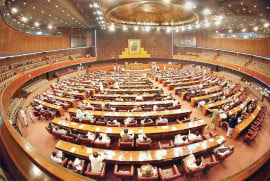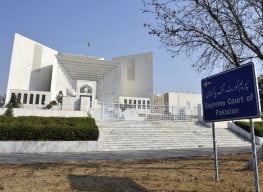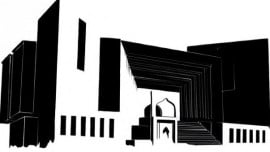
The Supreme Court has ruled that a court cannot examine the merit of a case if an accused, seeking a pre-arrest bail, does not appear before it.
"Section 498-A, CrPC [Code of Criminal Procedure] creates a statutory fetter or a statutory pre-condition requiring the presence of the petitioner in person in court for the exercise of jurisdiction by the court for granting pre-arrest bail,” said a five-page judgment authored by Justice Syed Mansoor Ali Shah.
Justice Shah was part of a division bench also comprising Justice Aminuddin Khan that heard a pre-arrest bail petition. The Lahore High Court (LHC) had earlier dismissed the pre-arrest bail petition of the accused persons both on basis of merit and due to non-prosecution.
According to the verdict, “In case the petitioner (accused) is not personally present in court, the court is not authorized to grant him bail and the petition is to be dismissed for his lack of presence in court.”
However, the verdict clarified, in case some explanation is furnished for a non-appearance, the court may, if it finds that explanation to be satisfactory, exempt the presence of an accused for that day and adjourn the hearing of the petition for a short period.
“The court cannot, in the absence of the personal appearance of the petitioner, travel further into the case and examine the merits of the case. In fact examination of the merits of the case in the absence of the accused totally defeats the intent and purpose of the aforementioned statutory provision,” it added.
The verdict said once a court proceeds to examine the merits of a case, then it has the option to either dismiss or allow the bail petition, while under Section 498-A CrPC the Court is not authorized to admit the accused to bail in his absence.
It said the petitioners had not personally appeared before the LHC despite repeated calls and, therefore, their bail petitions could not have proceeded further in terms of section 498-A CrPC, which says that appearance of an accused is mandatory for grant of pre-arrest bail.
The apex court noted that no reason has been given by the petitioners in the instant petition before the SC regarding their non-appearance before the LHC, and the petitioners have thus shown no legal defect in the impugned order, for dismissing their pre-arrest bail petition due to their non-appearance.
“This alone merits dismissal of the instant petition,” it said.
The order clarified that in case the petition is dismissed for non-appearance of the accused in a pre-arrest bail matter under Section 498-A CrPC, the petitioner can file a fresh bail petition before the same court provided that he furnishes sufficient explanation for his non-appearance in the earlier bail petition and the court is satisfied with his said explanation.
"But if he fails to furnish any satisfactory explanation, his second bail petition is liable to be dismissed on account of his conduct of misusing the process of court disentitling him to the grant of discretionary relief of pre-arrest bail."
The court noted that in the present case, the LHC could not have dismissed the petition on merits, in addition to dismissing the same for non-prosecution due to the personal absence of the petitioner under Section 498-A CrPC.
“Therefore, the observations of the high court regarding the merits of the case are not sustainable and hereby set aside. The petitioners are free to file a fresh bail petition, if so advised, before the High Court by giving explanation for their absence before the court in their first bail petition.”
Justice Shah further clarified that an interim bail granted in a pre-arrest application on the first hearing is to simply ensure that the petitioner is present on all the subsequent dates of hearing in the pre-arrest bail matter.
"Petitioner’s presence is, therefore, required throughout the proceedings of the pre-arrest bail petition and the fact that he appeared on the first date when ad interim bail was granted does not in any manner lessen the rigours of Section 498-A CrPC or absolve the responsibility of the accused from appearing in person before the court," said the order.






















COMMENTS
Comments are moderated and generally will be posted if they are on-topic and not abusive.
For more information, please see our Comments FAQ